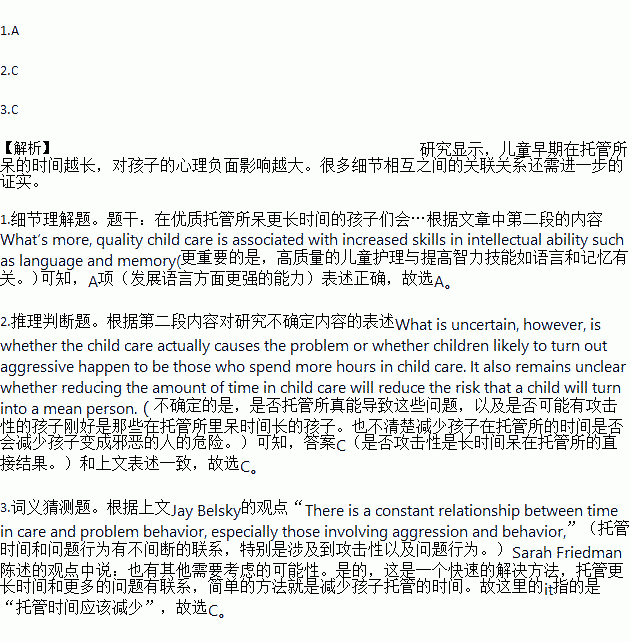题目内容
The more hours young children spend in child care, the more likely they are to turn out aggressive and disobedient by the time they are in kindergarten, according to the largest study of child care and development ever conducted. Researchers said this correlation(相关性) held true regardless of whether the children came from rich or poor homes, were looked after by a relative or at a center, and whether they were girls or boys.
What is uncertain, however, is whether the child care actually causes the problem or whether children likely to turn out aggressive happen to be those who spend more hours in child care. It also remains unclear whether reducing the amount of time in child care will reduce the risk that a child will turn into a mean person. What's more, quality child care is associated with increased skills in intellectual ability such as language and memory, leading some academics to suggest that child care turns out children who are "smart and naughty".
The government-sponsored research, which has tracked more than 1,300 children at 10 sites across the country since 1991, is bound to cause the debate over child care again: How should people balance work and family? And how should parents, especially mothers, resolve the demands that are placed on them to be both breadwinners and supermoms?
That debate was already on display at a new briefing yesterday, where researchers themselves had different opinions about the data and its implications(含义). "There is a constant relationship between time in care and problem behavior, especially those involving aggression and behavior," said Jay Belsky of Birkbeck College in London, one of the lead investigators of the study who has previously annoyed women's groups because of his criticisms of child care. "On behalf of fathers or mothers?" interrupted Sarah Friedman, a developmental psychologist at the National Institute of Child Health and Human Development (NICHD) and one of the other lead scientists on the study. "On behalf of parents and families," responded Belsky.
"NICHD is not willing to get into policy recommendations," said Friedman, contradicting her colleague. "There are other possibilities that can be entertained. Yes it is a quick solution—more hours in child care is associated with more problems. The easy solution is to cut the number of hours but that may have implications for the family that may not be beneficial for the development of the children in terms of economics." In an interview after the briefing, Friedman said that asking parents to work fewer hours and spend more time with their children usually meant a loss of family income, which adversely(不利地)affects children.
Scientists said that the study was highly reliable. But the researchers said they had no whether the behavioral difficulties persisted as the children moved to higher grades.
1.Children who spend more time in quality child care will ________.
A. develop greater ability in language
B. be easy to manage and less naughty
C. possess great risk-taking spirit
D. be greedy and mean to their classmates
2.What is still unknown about higher level of aggressiveness in kindergarten children?
A. Whether higher level of aggressiveness can be avoided with longer child care.
B. Where longer child care equally affects children from different families.
C. Whether aggressiveness is a direct result of longer child care.
D. Whether longer child care improves intellectual ability in children.
3.In the fifth paragraph the word "it" probably mean “________”.
A. NICHD is unwilling to give parents recomme ndations
B. NICHD is willing to give policy advice concerning child care
C. the number of hours in child care should be reduced significantly
D. parents should discipline the behavior of their children more strictly
 世纪百通期末金卷系列答案
世纪百通期末金卷系列答案

 nd somebody who works around you complaining(抱怨) all the time, don't you? 1. About 70% of Americans say being around nonstop complainers sometimes has a bad influence on them. Luckily, here are 4 tips to help form positive patterns.
nd somebody who works around you complaining(抱怨) all the time, don't you? 1. About 70% of Americans say being around nonstop complainers sometimes has a bad influence on them. Luckily, here are 4 tips to help form positive patterns.